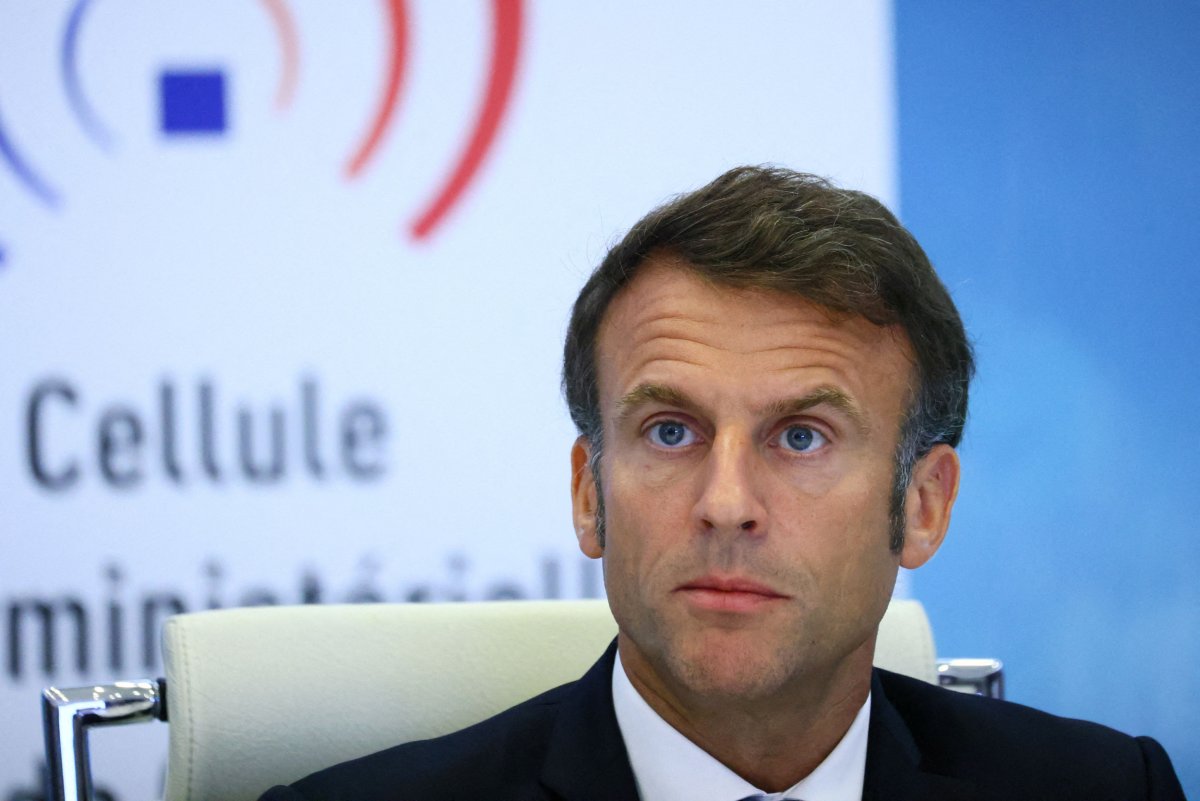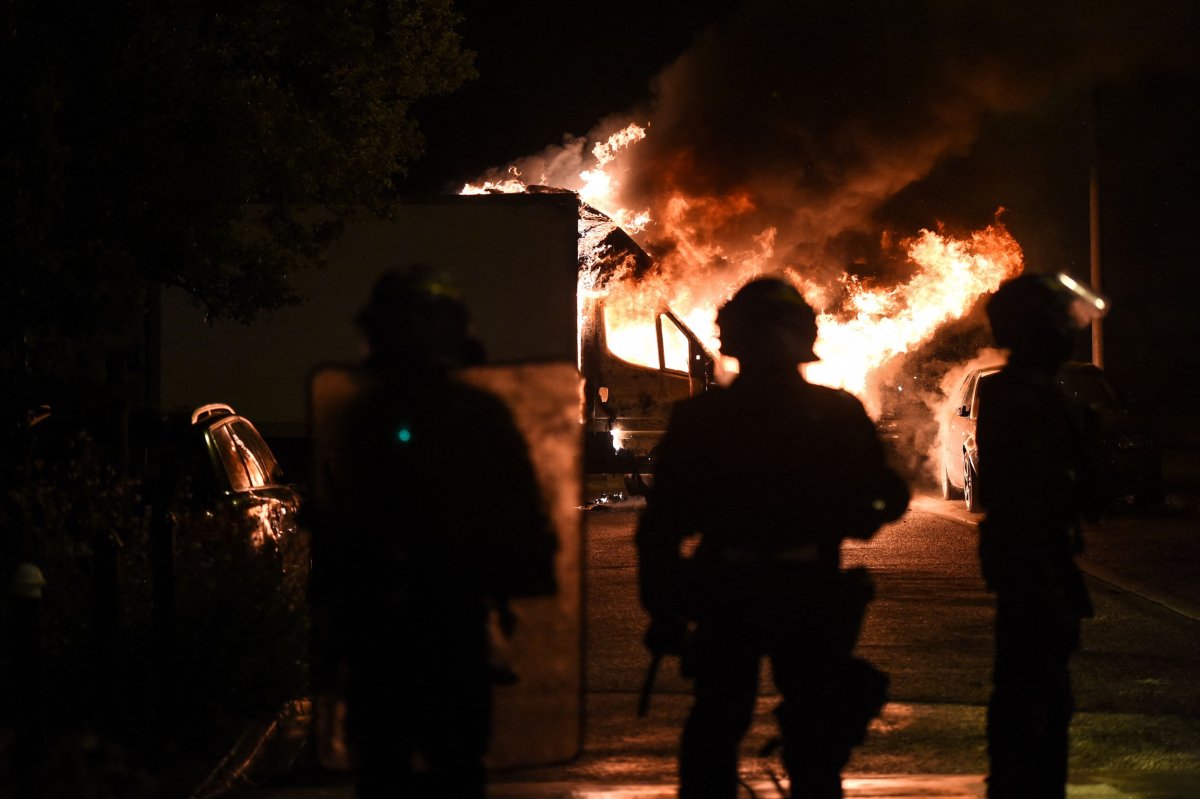The deadline that France's President Emmanuel Macron gave himself to heal the country after two-and-a-half months of protests over a controversial pension reform is coming up right as the country is once again burning.
On April 17, Macron—leader of the centrist Renaissance party and two-time president—gave himself 100 days to fix the fracture that had opened between France's government and the public, outraged by his plan to raise the retirement age from 62 to 64.
"On July 14, we must be able to take stock," Macron said on April 17, choosing France's national day, Bastille Day, as an important date for his government. "We have ahead of us 100 days of appeasement, unity, ambition and action for France."
But just three weeks away from Macron's deadline, France has been hit by protests over the police killing of a teenager of Algerian and Moroccan descent in the city of Nanterre.
After six consecutive nights of protests, Macron is facing another issue that might complicate his attempts to heal the country.

Why Is France Protesting?
Nahel Merzouk, 17, was shot dead by an officer during a traffic stop on June 27 after the teen had tried to drive away from the police. He was reportedly driving without a license but was unarmed.
Initial claims by the officer saying that he had acted in self-defense when he shot the teen—later proven false—contributed to outrage among the public, with previous cases of police brutality against French nationals and people of African descent exacerbating the situation.
"Groups of youngsters, racialized and living in deprived suburbs, are showing their deep discontent following the homicide of a young man killed by the police, something which probably will be quite familiar to an American public," Philippe Marlière, professor of French and European Politics at University College London told Newsweek.
"The situation is very similar to the murder of George Floyd, but France's George Floyd moment has been going on in the country for the past 40 years," he said. "Killing by the police of racialized kids in the suburbs has been happening for a long time."
The difference, Marlière said, is that the police have become more brutal in recent years and that French media have started to cover episodes of police brutality.
The killing of Merzouk "was a blank-point shooting, a fatal shooting, and everyone is shocked by it," Marlière said, adding that similar cases are common in France—but it's rare to have a clip showing evidence.
"It took that clip showing the truth to the world to bring Macron to say that it was inexcusable. Normally no mainstream politician would criticize the police," Marlière added, mentioning the significant power of police unions in France.
"France is a colorblind republic," Marlière said. "It doesn't want to assess if minorities are discriminated against because of the color of their skin or religion. For French law, every citizen is deemed equal, but of course, people know it's fiction. There's no positive discrimination, there's nothing. That's why you have this racial tension," he added.
"France is a country that doesn't want to discuss race and race relations," Marlière said. "But when you examine its politics, race is everywhere."

What Is Macron's Self-Imposed Deadline?
In an attempt to move on from his unpopular pension reform, Macron presented three projects in April, all related to appeasing the anger of workers and fixing long-standing problems in French society: a "new pact of life at work...by social dialogue;" delinquency and illegal immigration; and "progress for better living."
The plan, to be completed after 100 days, was to relaunch Macron's administration after its rocky start. But the protests sparked by Merzouk's death have thwarted the president's plan, with France being far from being "appeased."
How Is Macron Polling?
Macron is deeply unpopular in France, with 67 percent of French voters disapproving of the president as of June 22, according to data from Politico. Only 30 percent of French voters approved of the president.
The number of French voters disapproving of Macron is now even higher than in January at the height of the pension reform protests when 63 percent disapproved of the president.
For Marlière, Macron "is on a tightrope."
"He's got no majority in the House to pass legislation, so he has to rely on ad hoc majorities, and it's very hard," Marlière said.
"You have that in the context of the rise of the far-right in France, and you can imagine that those riots will play very favorably for the far-right, while the left will get no benefits," he added.
What Are the Alternatives to Macron?
"I think the situation is very unstable in France. Anything could happen," Marlière said.
"There's no clear majority. It's Macron's last term, and an incumbent president can't run again, it's the same in the U.S. So it's very difficult for Macron to get over the previous crisis—the pension reform—because there's a new one now."
Marlière said that Macron seems to go "from one crisis to another," and nobody knows what his plan for his second term really is.
"He's unpopular, he doesn't have a majority. His main asset politically is his oppenents' weakness and division," he said.
Parties are currently divided into three blocks in French politics, Marlière explained: a very weakened left, Macron's center-right conservative block, and the rising far-right, with Marine Le Pen leading.
"It's very hard to predict what comes next, and impossible to predict who will win the next general presidential election in 2027," Marlière said. "If crises like the ones we talked about keep coming, I think Marine LePen would really have a decent chance to win this time around."
Uncommon Knowledge
Newsweek is committed to challenging conventional wisdom and finding connections in the search for common ground.
Newsweek is committed to challenging conventional wisdom and finding connections in the search for common ground.
About the writer
Giulia Carbonaro is a Newsweek Reporter based in London, U.K. Her focus is on U.S. and European politics, global affairs ... Read more
To read how Newsweek uses AI as a newsroom tool, Click here.








